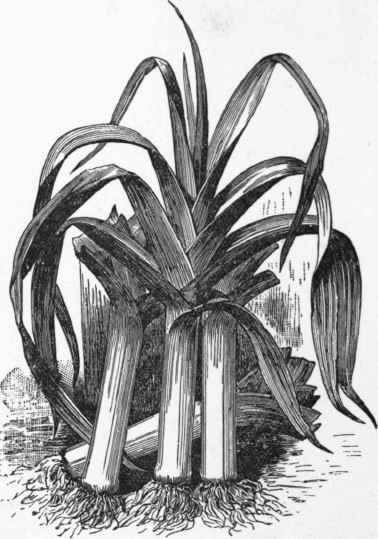17. Leeks
Description
This section is from the book "Commercial Gardening Vol4", by John Weathers (the Editor). Also available from Amazon: Commercial Gardening, A Practical & Scientific Treatise For Market Gardeners.
17. Leeks
This widely used vegetable (Allium, Porrum) is increasing in importance since the practice has spread of using it as a boiled vegetable and not only as a flavouring. It requires rich land to come a good size.
The giant specimens with bleached stems 1 ft. in length that one sees at vegetable shows, like so many other show items, are not commercially possible. The leek of the market is sown first of all for early work in February under glass, and for the main crop in March out-of-doors. Plantings begin in April, and can be continued up to the end of June. In order to get as much bleach as possible drills are made, either by weighting the racer or with a hoe, 1 ft. apart, and the Leek plants dibbled in these 6 in. from plant to plant, and the plants put down in the holes up to where the leaves branch.
Leeks are trimmed of outside leaves and made into fan-shaped bunches, six or eight to a bunch, according to size, and washed before sending to market. Two good varieties are Musselburgh and the Lyon. The price is 1s. to 2s. per dozen, and the crop 2 1/2 to 3 dozen bunches per pole. The cost of digging, trimming, and washing is 3 1/2d to 4d per dozen bunches. The planting of a crop of Leeks will cost 35s. to 40s. per acre and the hoeing about £3 per acre.

Fig. 478. - Leek.
Leeks draw the land very much, so that after them the next crop usually requires generous preparation for it. The Leek is useful to plant on land which has clubbed with Cabbage crops - first, because it is immune to the disease; and secondly, because it frequently cures the land of the tendency for the next crop. [W. G. L].
Leeks at Evesham are a more valuable crop after a "hard" winter than after a mild winter. The seed is sown in February, and the young Leeks planted in breadths on the level ground in May and June, the soil being rich. They are planted in rows 12 or 14 in. apart, and about 9 to 12 in. apart in the rows. The method of planting is to make a deep hole with a dibber and just drop the plant therein root downwards, that is all - no pressing of soil over the roots and around the stem. Leeks, French Beans, and Broad Beans are mainly "catch crops" in South Worcestershire. [J. U].
Continue to:


